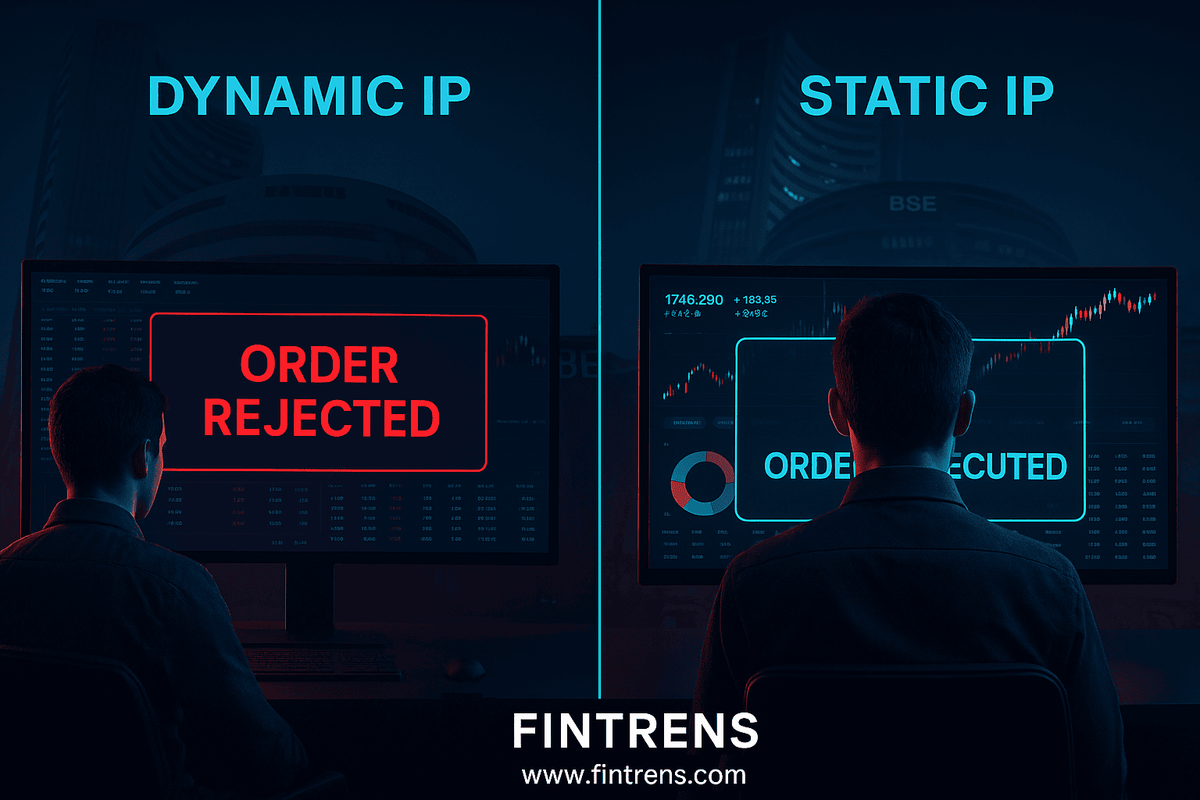Static IP vs Dynamic IP – Why It Matters for Trading Bots

If you're running trading bots in India, this distinction can mean the difference between seamless execution and total rejection. With NSE’s 2025 mandate for retail algo trading, understanding why static IPs matter more than ever is critical for compliance and performance.
📈 The Basics: Static IP vs Dynamic IP
| Type | IP Changes? | Assigned By | Traceability | NSE Compliance |
|---|---|---|---|---|
| Static IP | Remains Fixed | ISP/Cloud Provider | High | ✅ Required |
| Dynamic IP | Changes Regularly | ISP/Router DHCP | Low | ❌ Rejected |
🔎 What is a Static IP?
A static IP is a permanent address assigned to your device or server. It never changes over time and can be uniquely tied to your trading account. Static IPs are provided by ISPs (for local setups) or come bundled with cloud VMs (e.g., DigitalOcean, AWS).
🔎 What is a Dynamic IP?
A dynamic IP is assigned temporarily by your broadband provider or mobile network each time you connect. It frequently changes, cannot be relied on, and is not traceable for regulatory audit purposes.
⚠️ Why Dynamic IP = Rejected Trades
With NSE's static IP circular (Ref: INVG67858), all retail algo trades via API must originate from pre-approved static IPs. If you use a dynamic IP:
- Your broker will reject order placements
- NSE audits may flag violations
- There is no way to trace who placed what order
❌ Using mobile hotspots, VPNs with rotating IPs, or unregistered broadband connections? That’s a compliance failure.
🛡️ Why Static IP is Crucial for Bots
Trading bots (even those placing <10 orders/sec) rely on:
- Reliable connectivity
- Whitelisted network identity
- Auditability for SEBI/NSE tracking
A static IP ensures:
- You remain compliant with NSE's infrastructure
- Your orders aren’t randomly blocked
- Your bot maintains connectivity during volatile sessions
📊 Real-World Scenarios
✅ Example 1: Retail Trader using Zerodha API
- ISP: Airtel static IP plan
- Setup: Python bot on home desktop
- ✅ Broker whitelisted static IP
- ✅ Fully compliant
❌ Example 2: Trader using cloud bot on random VPS
- IP: Dynamic IPv6
- ❌ Rejected at broker gateway
- ❌ NSE non-compliant
✨ Pro Tip: Use DigitalOcean or AWS with Reserved IPv4
Cloud services like DigitalOcean offer reserved static IPs for each VM.
- Predictable pricing
- Easy whitelisting
- Used by Fintrens bots with 99.9% uptime
💼 Conclusion
The switch to static IP is not just technical—it's mandatory and critical. Whether you're trading with Firefly or building your own bots, ensuring that your IP address is static, traceable, and broker-approved is the foundation of seamless, compliant algo trading.
✉️ Need help setting up your static IP? Leave a comment below and our team will guide you. For technical docs, visit docs.firefly.fintrens.com




